Organized by Bo-Hsiang
SOW Interview
Dr. Lee, Wei-Wen Profile (Dentist, Writer, Conservation Volunteer)
 Dr. Lee’s motto is “Never enough time for fun”. His most desired gifts in life are compassion and wisdom. The wisdom comes from reading, and the compassion is realized through calling friends to engage in public services. Therefore, his focus of life consists of reading, friendship, and nature.
Dr. Lee’s motto is “Never enough time for fun”. His most desired gifts in life are compassion and wisdom. The wisdom comes from reading, and the compassion is realized through calling friends to engage in public services. Therefore, his focus of life consists of reading, friendship, and nature.
As he likes to spend time with friends and in nature, he used to be the scout leader 30 years ago, and 20 years ago his friend and him established the Society of Wilderness. In the early stage, SOW used Dr. Lee’s clinic as its office. Dr. Lee also served as committee member for Executive Yuan National Sustainable Development and Ministry of the Interior – National Land Resource Committee, and Network, advisor of the Ministry of Education – Environmental committee.
 With his passion for reading, he has turned his clinic into a library where the public can come and borrow books. He used to be a judge for the Golden Tripod Award and member of the review committee for Book Recommendation and Designated Reading for public workers.
With his passion for reading, he has turned his clinic into a library where the public can come and borrow books. He used to be a judge for the Golden Tripod Award and member of the review committee for Book Recommendation and Designated Reading for public workers.
Furthermore, Dr. Lee believes that photography can have a positive influence on people, so he served as a director of public television companies and has accompanied children to learn life education from movies.
Dr. Lee shares his experience and opinion through writing. He has columns on over 10 media platforms and has over 30 publications.
★ 2012-Present, Broadcast host of People and Land
★ 2017-Present, TV host of “In Search for Lost Time, An Asian Documentary”, available on Youtube.
▲ Source:Dr. Lee, Wei-Wen
Interview with Dr. Lee, Wei-Wen
| 1. |
What is the difference between the work done by SOW and other environmental groups?
(I-Chia) |
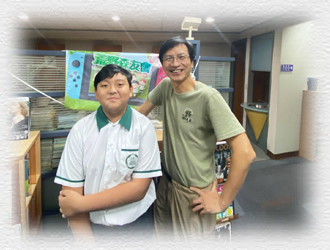 SOW is an ecological conservation group, which is different from the typical environmental protection group. The true purpose of environmental protection should be friendly protection of biological habitats. However, in Taiwan, environmental protection is often narrowed to urban environments. For example, the Environmental Protection Administration is in charge of daily waste and air pollution, etc. Wilderness protection such as conservation of forests and rivers is under supervision of the Forestry Bureau. On the other hand, SOW focuses on protection of all biological habitats. For example, the Wugu Wetland and surrounding species were gradually disappearing due to over development of human beings. We try to restore the habitat to allow all species to be able to remain in the wetland through habitat work and protection. This is what SOW has to do.
SOW is an ecological conservation group, which is different from the typical environmental protection group. The true purpose of environmental protection should be friendly protection of biological habitats. However, in Taiwan, environmental protection is often narrowed to urban environments. For example, the Environmental Protection Administration is in charge of daily waste and air pollution, etc. Wilderness protection such as conservation of forests and rivers is under supervision of the Forestry Bureau. On the other hand, SOW focuses on protection of all biological habitats. For example, the Wugu Wetland and surrounding species were gradually disappearing due to over development of human beings. We try to restore the habitat to allow all species to be able to remain in the wetland through habitat work and protection. This is what SOW has to do.
| 2. |
In regard to participation in SOW’s Parent-Child Group, can you share what impressed you the most and what is the impact on the parent-child relationship? (Tzu-Ning) |
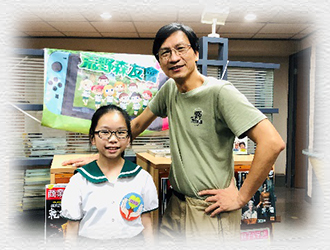 SOW Parent-Child Group has been established for almost 20 years. There are over 4000 families with more than 500 groups with 30~40 people in a group. The best thing about this group is that it creates an opportunity to establish mutual goals and actions between parent and child or even partners. The most precious experience is that dozens of families can learn and do volunteer work together for a long time, from a few years up to 12 years. Because family members have common goals, they have better relationships and valuable memories. Some of the children who participated in the parent-child group have grown up and I can clearly see they are different from others, especially in having good communication skills. The children in the group are used to interaction with strangers. Through friendly interactions, these children will be less afraid to communicate with their supervisors when they grow up and start working. They will be more confident, unlike other children who are less proactive and less willing to make initiatives. The Parent-Child Group provides ample opportunities for children to express their opinions on social issues, as well as in-person participation. I think this is the reason that makes the group special. It is great to have participation opportunities!
SOW Parent-Child Group has been established for almost 20 years. There are over 4000 families with more than 500 groups with 30~40 people in a group. The best thing about this group is that it creates an opportunity to establish mutual goals and actions between parent and child or even partners. The most precious experience is that dozens of families can learn and do volunteer work together for a long time, from a few years up to 12 years. Because family members have common goals, they have better relationships and valuable memories. Some of the children who participated in the parent-child group have grown up and I can clearly see they are different from others, especially in having good communication skills. The children in the group are used to interaction with strangers. Through friendly interactions, these children will be less afraid to communicate with their supervisors when they grow up and start working. They will be more confident, unlike other children who are less proactive and less willing to make initiatives. The Parent-Child Group provides ample opportunities for children to express their opinions on social issues, as well as in-person participation. I think this is the reason that makes the group special. It is great to have participation opportunities!
| 3. |
When did you become interested in environmental protection? When you were little or was it triggered by a special event? (Shih-Chi) |
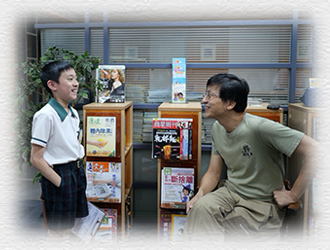 SOW has been established for 25 years, but when I was a child, there was no general awareness on environmental protection because there was no destruction of the environment back then. When I was in university, it was really disappointing to see that the environment condition had started to deteriorate due to economic growth. As I studied dentistry, which is related to biology, naturally I had developed a strong interest and sense of duty in environmental issues. Therefore, I established the Society of Wilderness, and I hope that through SOW, we can educate everyone about the concept of environmental protection.
SOW has been established for 25 years, but when I was a child, there was no general awareness on environmental protection because there was no destruction of the environment back then. When I was in university, it was really disappointing to see that the environment condition had started to deteriorate due to economic growth. As I studied dentistry, which is related to biology, naturally I had developed a strong interest and sense of duty in environmental issues. Therefore, I established the Society of Wilderness, and I hope that through SOW, we can educate everyone about the concept of environmental protection.
| 4. |
SOW is very experienced in wetland conservation. From escrow, adoption, donation from foundations, and possible subsidy from the government, what are the advantages and disadvantages? Which option do you think is the most effective model for habitat restoration? (Hao-Cheng) |
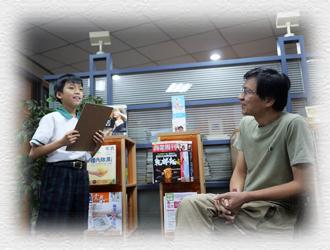 SOW does not take a gradual approach toward wetland protection. As long as there are resources available or suitable methods, SOW will apply it into wetland protection. Whether there are corporate and foundation sponsorship or government subsidy, SOW is committed to put in 100% effort to protect wetland habitats. If SOW considers a given wetland is crucial to the ecosystem, it will take initiative to adopt and manage the wetland. As long as there are volunteers who are willing to protect the environment, SOW will continue to commit to protecting the wetland and its habitats.
SOW does not take a gradual approach toward wetland protection. As long as there are resources available or suitable methods, SOW will apply it into wetland protection. Whether there are corporate and foundation sponsorship or government subsidy, SOW is committed to put in 100% effort to protect wetland habitats. If SOW considers a given wetland is crucial to the ecosystem, it will take initiative to adopt and manage the wetland. As long as there are volunteers who are willing to protect the environment, SOW will continue to commit to protecting the wetland and its habitats.
| 5. |
Nice to meet you Dr. Lee. As the spiritual leader of SOW, in regard to Ocean conservation, can you provide some insights to members and young students? (Yu-Chen) |
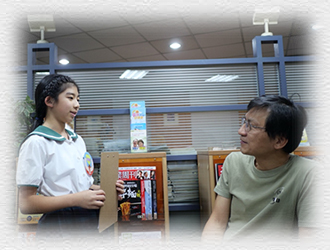 About ocean conservation, SOW mentions the following: 1. Reduce the production of waste, and 2. Eat Smart, Sustainable Ocean. SOW hosts several beach cleanups each year. Each cleanup always ends up with large amounts of garbage. These garbage not only come from the beach, but also from the ocean as well. The media often reports marine animals being killed by consuming garbage. Therefore, it is necessary to reduce the amount of waste we produce, and recycle and reuse whenever possible. We also should not disrupt the ocean’s food chain. Eat smart and consume the right seafoods for a sustainable ocean environment. Do not doubt an individual’s effort, it all starts from one person and it can spread environmental awareness to the people around, then a pollution-free ocean environment is just around the corner.
About ocean conservation, SOW mentions the following: 1. Reduce the production of waste, and 2. Eat Smart, Sustainable Ocean. SOW hosts several beach cleanups each year. Each cleanup always ends up with large amounts of garbage. These garbage not only come from the beach, but also from the ocean as well. The media often reports marine animals being killed by consuming garbage. Therefore, it is necessary to reduce the amount of waste we produce, and recycle and reuse whenever possible. We also should not disrupt the ocean’s food chain. Eat smart and consume the right seafoods for a sustainable ocean environment. Do not doubt an individual’s effort, it all starts from one person and it can spread environmental awareness to the people around, then a pollution-free ocean environment is just around the corner.
| 6. |
In order to achieve the ideal of an eco-city, it requires cooperation and collaboration from government officials, corporations, and environmental groups. I would like to ask Dr. Lee how to coordinate and find the balance between all parties when conflicts occur. Since the establishment of SOW, are current environmental changes different than your previous expectation? (Bo-Hsiang) |
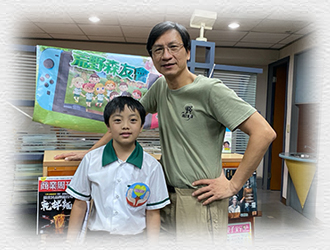 In our expectation, eco-city is an ideal city that contains plants and animals, such as flowers and trees, insects, frogs and other species. At the same time, human beings coexist with these life forms in the same environment, making it rich and interesting. The realization of an eco-city requires the joint efforts of the three key parties: government, corporations, and civil organizations. When there are conflicts or differences of opinions, SOW will try to find a way that works for all parties. Since there are several parties involved in the project, with different positions come with different opinions. How to work through the difference and keep moving forward is what SOW has to do. It requires extensive effort to find a solution that works for all three parties. Not only do you have to read a lot of books, but you must also consider and understand the concerns of individuals, corporations, and governments. Therefore, in order for each civil organization to achieve the expected results, we must put ourselves in their shoes and make best effort to achieve the mutual ideals through understanding, communication, and collaboration.
In our expectation, eco-city is an ideal city that contains plants and animals, such as flowers and trees, insects, frogs and other species. At the same time, human beings coexist with these life forms in the same environment, making it rich and interesting. The realization of an eco-city requires the joint efforts of the three key parties: government, corporations, and civil organizations. When there are conflicts or differences of opinions, SOW will try to find a way that works for all parties. Since there are several parties involved in the project, with different positions come with different opinions. How to work through the difference and keep moving forward is what SOW has to do. It requires extensive effort to find a solution that works for all three parties. Not only do you have to read a lot of books, but you must also consider and understand the concerns of individuals, corporations, and governments. Therefore, in order for each civil organization to achieve the expected results, we must put ourselves in their shoes and make best effort to achieve the mutual ideals through understanding, communication, and collaboration.
| 7. |
In recent years, camping has become very popular and has resulted in waste being disposed of into forests and rivers. These wastes often travel with the stream and often end up on the beach. How should the government regulate camping activities in order to have a balance between leisure and environment? (Hsin-Ai) |
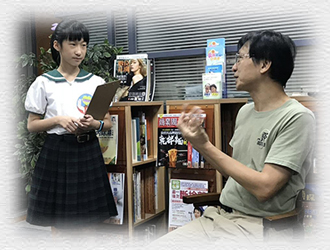 Education is needed in order to take care of the environment while camping. Through education, we can let people understand how to truly enjoy nature, instead of just taking things from their home to the campsite, which often generates a lot of wastes. If campers fail to properly dispose of the wastes, large amounts of garbage will cause pollution. The most basic solution is that the campers should do proper cleanup before they leave the campsite, as well as using the simplest and most convenient food such as Zonzi (rice dumpling). The leaf wrap is natural, which does not produce too much wastes. Simplifying eating in the wild will allow people to have more time to enjoy and interact with nature. Therefore, education on such concepts is the key to solve the problems.
Education is needed in order to take care of the environment while camping. Through education, we can let people understand how to truly enjoy nature, instead of just taking things from their home to the campsite, which often generates a lot of wastes. If campers fail to properly dispose of the wastes, large amounts of garbage will cause pollution. The most basic solution is that the campers should do proper cleanup before they leave the campsite, as well as using the simplest and most convenient food such as Zonzi (rice dumpling). The leaf wrap is natural, which does not produce too much wastes. Simplifying eating in the wild will allow people to have more time to enjoy and interact with nature. Therefore, education on such concepts is the key to solve the problems.
| 8. |
In your opinion, what is the most challenging difficulty you have encountered while promoting environmental education? (Chia-Kai) |
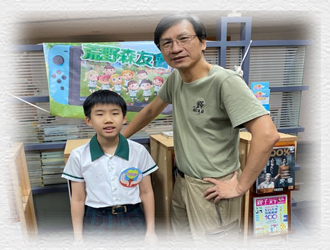 I don’t think it was difficult. It’s all about perspective and we make efforts to deal with all the difficulties we have ever encountered. We often find something challenging because we are unable to achieve the desired result after trying. However, if we lower our expectation from the beginning and not to be tied up into the spiral of the output of our effort, we will not consider it to be a setback or difficult encounter. We only need to believe that our efforts will have a positive impact in the end, even if that impact is not immediately visible. So in the end it’s all about adjusting our own mindset.
I don’t think it was difficult. It’s all about perspective and we make efforts to deal with all the difficulties we have ever encountered. We often find something challenging because we are unable to achieve the desired result after trying. However, if we lower our expectation from the beginning and not to be tied up into the spiral of the output of our effort, we will not consider it to be a setback or difficult encounter. We only need to believe that our efforts will have a positive impact in the end, even if that impact is not immediately visible. So in the end it’s all about adjusting our own mindset.
| 9. |
If you are the Minister of the Environmental Protection Administration (EPA), which environmental policy do you want to improve or promote the most? (Tzu-Chun) |
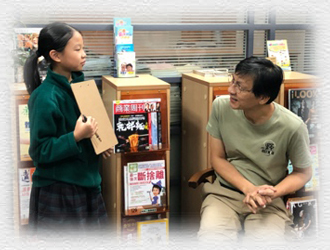 A government policy cannot go forward if it’s not supported by the general public. Civil organizations can represent the public and provide valuable suggestions and feedback to the government. The most difficult thing is how to provide the public with the information and knowledge to support the government’s proposals, not simply rely on a specific governmental position or authority. The work of the EPA is environmental work that is visible to the public. On the other hand, what SOW does is to go into the habitats, forests, and mountains to protect the natural environment that is easily overlooked by people. If I have 100% authority, I am extremely concerned about the cementation of rivers in Taiwan. Taiwan has many mountains, the more concentrated rain in recent years has led to people putting tetrapods and cement by the rivers to prevent flooding and landslides. When cement is used, a river can become a ditch as the cement solidates the river beds and destroys the ecosystem. This is a waste of taxpayer money and harmful to the environment. Therefore, I wish I can improve this unrealistic soil and water conservation method and truly achieve the ideal of sustainable mountains and forests.
A government policy cannot go forward if it’s not supported by the general public. Civil organizations can represent the public and provide valuable suggestions and feedback to the government. The most difficult thing is how to provide the public with the information and knowledge to support the government’s proposals, not simply rely on a specific governmental position or authority. The work of the EPA is environmental work that is visible to the public. On the other hand, what SOW does is to go into the habitats, forests, and mountains to protect the natural environment that is easily overlooked by people. If I have 100% authority, I am extremely concerned about the cementation of rivers in Taiwan. Taiwan has many mountains, the more concentrated rain in recent years has led to people putting tetrapods and cement by the rivers to prevent flooding and landslides. When cement is used, a river can become a ditch as the cement solidates the river beds and destroys the ecosystem. This is a waste of taxpayer money and harmful to the environment. Therefore, I wish I can improve this unrealistic soil and water conservation method and truly achieve the ideal of sustainable mountains and forests.
▲ Source: Wilderness Crossing
Interview Conclusion
The Society of Wilderness (SOW) has 25 years of presence. It is an ecological conservation group, which is different from the typical environmental protection group. SOW focuses on protection of ecological habitats so all the original habitat species can continue to live in the same environment through conservation work. This is what SOW does.
The purpose of SOW is to obtain management rights to lands through purchase, long term lease, commission, or donation, and allow nature to breed its ecosystem and restore life to that land. With the wilderness environment we have preserved, this will allow future generations to explore nature’s mysteries and learn about the meaning of life.
Through our conversation with Dr. Lee, we also learned about SOW’s missions: 1. Preservation of natural species in Taiwan, 2. Natural succession of local wilderness, 3. Promote the concept of environmental conservation, 4. Provide the environment and opportunity for environmental education to the general public, 5. Assist government on soil and water conservation and control natural resources, 6. Training natural ecological /environmental protection specialists.
We were deeply touched and moved by seeing a SOW member’s ideal and persistence in striving for a better environment from Dr. Lee. It led us to reflect on what we can do for the environment as elementary school students. In my opinion, in school, we can share what we have learned to our classmates in class, including the definition of eco-city, how to make contribution to environmental protection, observation of Taiwan’s ocean pollution, the cause of endangered species, and impact from factory pollution, etc. Through our effort we hope to persuade more people to work together for a better living environment.
▲ Source: Wilderness Crossing
 Dr. Lee’s motto is “Never enough time for fun”. His most desired gifts in life are compassion and wisdom. The wisdom comes from reading, and the compassion is realized through calling friends to engage in public services. Therefore, his focus of life consists of reading, friendship, and nature.
Dr. Lee’s motto is “Never enough time for fun”. His most desired gifts in life are compassion and wisdom. The wisdom comes from reading, and the compassion is realized through calling friends to engage in public services. Therefore, his focus of life consists of reading, friendship, and nature.  With his passion for reading, he has turned his clinic into a library where the public can come and borrow books. He used to be a judge for the Golden Tripod Award and member of the review committee for Book Recommendation and Designated Reading for public workers.
With his passion for reading, he has turned his clinic into a library where the public can come and borrow books. He used to be a judge for the Golden Tripod Award and member of the review committee for Book Recommendation and Designated Reading for public workers.
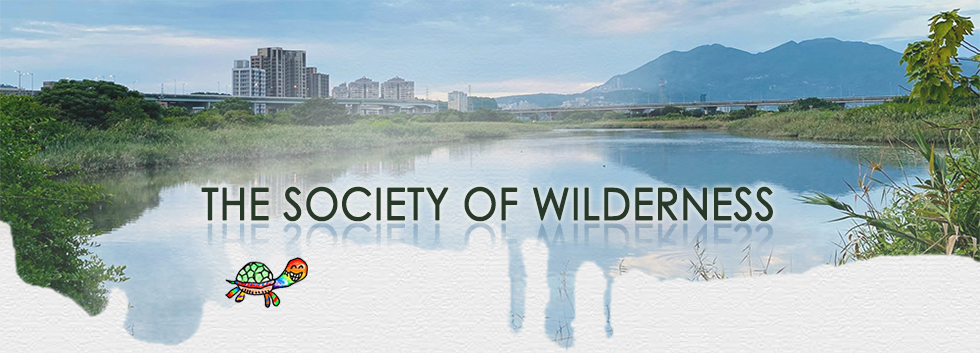
 SOW is an ecological conservation group, which is different from the typical environmental protection group. The true purpose of environmental protection should be friendly protection of biological habitats. However, in Taiwan, environmental protection is often narrowed to urban environments. For example, the Environmental Protection Administration is in charge of daily waste and air pollution, etc. Wilderness protection such as conservation of forests and rivers is under supervision of the Forestry Bureau. On the other hand, SOW focuses on protection of all biological habitats. For example, the Wugu Wetland and surrounding species were gradually disappearing due to over development of human beings. We try to restore the habitat to allow all species to be able to remain in the wetland through habitat work and protection. This is what SOW has to do.
SOW is an ecological conservation group, which is different from the typical environmental protection group. The true purpose of environmental protection should be friendly protection of biological habitats. However, in Taiwan, environmental protection is often narrowed to urban environments. For example, the Environmental Protection Administration is in charge of daily waste and air pollution, etc. Wilderness protection such as conservation of forests and rivers is under supervision of the Forestry Bureau. On the other hand, SOW focuses on protection of all biological habitats. For example, the Wugu Wetland and surrounding species were gradually disappearing due to over development of human beings. We try to restore the habitat to allow all species to be able to remain in the wetland through habitat work and protection. This is what SOW has to do. SOW Parent-Child Group has been established for almost 20 years. There are over 4000 families with more than 500 groups with 30~40 people in a group. The best thing about this group is that it creates an opportunity to establish mutual goals and actions between parent and child or even partners. The most precious experience is that dozens of families can learn and do volunteer work together for a long time, from a few years up to 12 years. Because family members have common goals, they have better relationships and valuable memories. Some of the children who participated in the parent-child group have grown up and I can clearly see they are different from others, especially in having good communication skills. The children in the group are used to interaction with strangers. Through friendly interactions, these children will be less afraid to communicate with their supervisors when they grow up and start working. They will be more confident, unlike other children who are less proactive and less willing to make initiatives. The Parent-Child Group provides ample opportunities for children to express their opinions on social issues, as well as in-person participation. I think this is the reason that makes the group special. It is great to have participation opportunities!
SOW Parent-Child Group has been established for almost 20 years. There are over 4000 families with more than 500 groups with 30~40 people in a group. The best thing about this group is that it creates an opportunity to establish mutual goals and actions between parent and child or even partners. The most precious experience is that dozens of families can learn and do volunteer work together for a long time, from a few years up to 12 years. Because family members have common goals, they have better relationships and valuable memories. Some of the children who participated in the parent-child group have grown up and I can clearly see they are different from others, especially in having good communication skills. The children in the group are used to interaction with strangers. Through friendly interactions, these children will be less afraid to communicate with their supervisors when they grow up and start working. They will be more confident, unlike other children who are less proactive and less willing to make initiatives. The Parent-Child Group provides ample opportunities for children to express their opinions on social issues, as well as in-person participation. I think this is the reason that makes the group special. It is great to have participation opportunities! SOW has been established for 25 years, but when I was a child, there was no general awareness on environmental protection because there was no destruction of the environment back then. When I was in university, it was really disappointing to see that the environment condition had started to deteriorate due to economic growth. As I studied dentistry, which is related to biology, naturally I had developed a strong interest and sense of duty in environmental issues. Therefore, I established the Society of Wilderness, and I hope that through SOW, we can educate everyone about the concept of environmental protection.
SOW has been established for 25 years, but when I was a child, there was no general awareness on environmental protection because there was no destruction of the environment back then. When I was in university, it was really disappointing to see that the environment condition had started to deteriorate due to economic growth. As I studied dentistry, which is related to biology, naturally I had developed a strong interest and sense of duty in environmental issues. Therefore, I established the Society of Wilderness, and I hope that through SOW, we can educate everyone about the concept of environmental protection. SOW does not take a gradual approach toward wetland protection. As long as there are resources available or suitable methods, SOW will apply it into wetland protection. Whether there are corporate and foundation sponsorship or government subsidy, SOW is committed to put in 100% effort to protect wetland habitats. If SOW considers a given wetland is crucial to the ecosystem, it will take initiative to adopt and manage the wetland. As long as there are volunteers who are willing to protect the environment, SOW will continue to commit to protecting the wetland and its habitats.
SOW does not take a gradual approach toward wetland protection. As long as there are resources available or suitable methods, SOW will apply it into wetland protection. Whether there are corporate and foundation sponsorship or government subsidy, SOW is committed to put in 100% effort to protect wetland habitats. If SOW considers a given wetland is crucial to the ecosystem, it will take initiative to adopt and manage the wetland. As long as there are volunteers who are willing to protect the environment, SOW will continue to commit to protecting the wetland and its habitats. About ocean conservation, SOW mentions the following: 1. Reduce the production of waste, and 2. Eat Smart, Sustainable Ocean. SOW hosts several beach cleanups each year. Each cleanup always ends up with large amounts of garbage. These garbage not only come from the beach, but also from the ocean as well. The media often reports marine animals being killed by consuming garbage. Therefore, it is necessary to reduce the amount of waste we produce, and recycle and reuse whenever possible. We also should not disrupt the ocean’s food chain. Eat smart and consume the right seafoods for a sustainable ocean environment. Do not doubt an individual’s effort, it all starts from one person and it can spread environmental awareness to the people around, then a pollution-free ocean environment is just around the corner.
About ocean conservation, SOW mentions the following: 1. Reduce the production of waste, and 2. Eat Smart, Sustainable Ocean. SOW hosts several beach cleanups each year. Each cleanup always ends up with large amounts of garbage. These garbage not only come from the beach, but also from the ocean as well. The media often reports marine animals being killed by consuming garbage. Therefore, it is necessary to reduce the amount of waste we produce, and recycle and reuse whenever possible. We also should not disrupt the ocean’s food chain. Eat smart and consume the right seafoods for a sustainable ocean environment. Do not doubt an individual’s effort, it all starts from one person and it can spread environmental awareness to the people around, then a pollution-free ocean environment is just around the corner.  In our expectation, eco-city is an ideal city that contains plants and animals, such as flowers and trees, insects, frogs and other species. At the same time, human beings coexist with these life forms in the same environment, making it rich and interesting. The realization of an eco-city requires the joint efforts of the three key parties: government, corporations, and civil organizations. When there are conflicts or differences of opinions, SOW will try to find a way that works for all parties. Since there are several parties involved in the project, with different positions come with different opinions. How to work through the difference and keep moving forward is what SOW has to do. It requires extensive effort to find a solution that works for all three parties. Not only do you have to read a lot of books, but you must also consider and understand the concerns of individuals, corporations, and governments. Therefore, in order for each civil organization to achieve the expected results, we must put ourselves in their shoes and make best effort to achieve the mutual ideals through understanding, communication, and collaboration.
In our expectation, eco-city is an ideal city that contains plants and animals, such as flowers and trees, insects, frogs and other species. At the same time, human beings coexist with these life forms in the same environment, making it rich and interesting. The realization of an eco-city requires the joint efforts of the three key parties: government, corporations, and civil organizations. When there are conflicts or differences of opinions, SOW will try to find a way that works for all parties. Since there are several parties involved in the project, with different positions come with different opinions. How to work through the difference and keep moving forward is what SOW has to do. It requires extensive effort to find a solution that works for all three parties. Not only do you have to read a lot of books, but you must also consider and understand the concerns of individuals, corporations, and governments. Therefore, in order for each civil organization to achieve the expected results, we must put ourselves in their shoes and make best effort to achieve the mutual ideals through understanding, communication, and collaboration. Education is needed in order to take care of the environment while camping. Through education, we can let people understand how to truly enjoy nature, instead of just taking things from their home to the campsite, which often generates a lot of wastes. If campers fail to properly dispose of the wastes, large amounts of garbage will cause pollution. The most basic solution is that the campers should do proper cleanup before they leave the campsite, as well as using the simplest and most convenient food such as Zonzi (rice dumpling). The leaf wrap is natural, which does not produce too much wastes. Simplifying eating in the wild will allow people to have more time to enjoy and interact with nature. Therefore, education on such concepts is the key to solve the problems.
Education is needed in order to take care of the environment while camping. Through education, we can let people understand how to truly enjoy nature, instead of just taking things from their home to the campsite, which often generates a lot of wastes. If campers fail to properly dispose of the wastes, large amounts of garbage will cause pollution. The most basic solution is that the campers should do proper cleanup before they leave the campsite, as well as using the simplest and most convenient food such as Zonzi (rice dumpling). The leaf wrap is natural, which does not produce too much wastes. Simplifying eating in the wild will allow people to have more time to enjoy and interact with nature. Therefore, education on such concepts is the key to solve the problems.  I don’t think it was difficult. It’s all about perspective and we make efforts to deal with all the difficulties we have ever encountered. We often find something challenging because we are unable to achieve the desired result after trying. However, if we lower our expectation from the beginning and not to be tied up into the spiral of the output of our effort, we will not consider it to be a setback or difficult encounter. We only need to believe that our efforts will have a positive impact in the end, even if that impact is not immediately visible. So in the end it’s all about adjusting our own mindset.
I don’t think it was difficult. It’s all about perspective and we make efforts to deal with all the difficulties we have ever encountered. We often find something challenging because we are unable to achieve the desired result after trying. However, if we lower our expectation from the beginning and not to be tied up into the spiral of the output of our effort, we will not consider it to be a setback or difficult encounter. We only need to believe that our efforts will have a positive impact in the end, even if that impact is not immediately visible. So in the end it’s all about adjusting our own mindset.  A government policy cannot go forward if it’s not supported by the general public. Civil organizations can represent the public and provide valuable suggestions and feedback to the government. The most difficult thing is how to provide the public with the information and knowledge to support the government’s proposals, not simply rely on a specific governmental position or authority. The work of the EPA is environmental work that is visible to the public. On the other hand, what SOW does is to go into the habitats, forests, and mountains to protect the natural environment that is easily overlooked by people. If I have 100% authority, I am extremely concerned about the cementation of rivers in Taiwan. Taiwan has many mountains, the more concentrated rain in recent years has led to people putting tetrapods and cement by the rivers to prevent flooding and landslides. When cement is used, a river can become a ditch as the cement solidates the river beds and destroys the ecosystem. This is a waste of taxpayer money and harmful to the environment. Therefore, I wish I can improve this unrealistic soil and water conservation method and truly achieve the ideal of sustainable mountains and forests.
A government policy cannot go forward if it’s not supported by the general public. Civil organizations can represent the public and provide valuable suggestions and feedback to the government. The most difficult thing is how to provide the public with the information and knowledge to support the government’s proposals, not simply rely on a specific governmental position or authority. The work of the EPA is environmental work that is visible to the public. On the other hand, what SOW does is to go into the habitats, forests, and mountains to protect the natural environment that is easily overlooked by people. If I have 100% authority, I am extremely concerned about the cementation of rivers in Taiwan. Taiwan has many mountains, the more concentrated rain in recent years has led to people putting tetrapods and cement by the rivers to prevent flooding and landslides. When cement is used, a river can become a ditch as the cement solidates the river beds and destroys the ecosystem. This is a waste of taxpayer money and harmful to the environment. Therefore, I wish I can improve this unrealistic soil and water conservation method and truly achieve the ideal of sustainable mountains and forests.